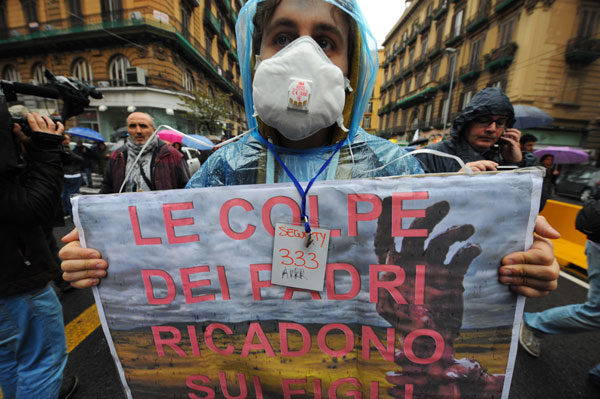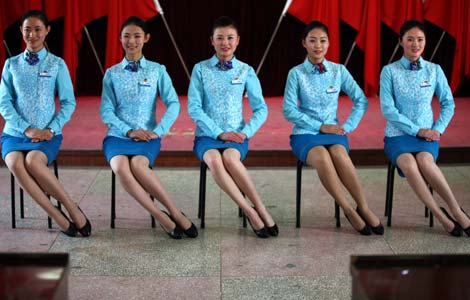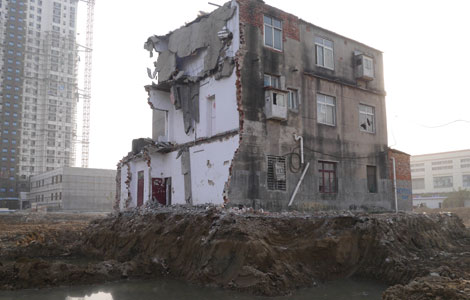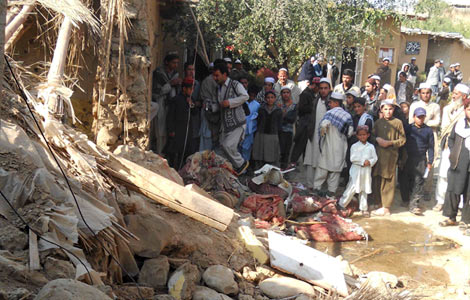Tackling air pollution is a joint venture
Updated: 2013-11-22 09:01
By Zhou Wa (China Daily)
|
||||||||
|
 |
|
An environmental protester demonstrates in Naples on Saturday against illegal waste dumps discovered around the city’s hinterland, where many people have died from toxic fumes after burning trash. The area, also called "Land of Fires" or "Dead Triangle", is where the Mafia has created hundreds of illegal dumps. MARIO LAPORTA / AGENCE FRANCE-PRESSE |
European and Asian countries should strengthen cooperation on environmental protection policies and technologies in order to overcome the common challenge of air pollution occurring as a result of economic and industrial development, said a senior Foreign Ministry official.
La Yifan, deputy director-general of the ministry's Department of International Organizations and Conferences, made the remarks in a recent interview with China Daily.
The ministry and the Ministry of Environmental Protection recently co-hosted the Asia-Europe Meeting Seminar on Capacity Building on Air Pollution Prevention and Control.
The Asia-Europe Meeting, founded in 1996, is a trans-regional inter-governmental forum for 51 Asian and European members of states and institutions.
"The developed European countries are rich in expertise and technology for air pollution prevention and control. There is great potential for Asian and European countries to share experiences and best practices, and to enhance policy dialogue and technology cooperation in this field," said La.
"It is in the common interests of both Asian and European countries to prevent and control air pollution. The two sides have a strong willingness and potential to cooperate. By organizing such a seminar, we hope to offer these countries a convenient platform by which to communicate with each other on air pollution prevention and control."
Air pollution has become a serious concern for the whole international community. It not only threatens human health but also damages the environment and impedes sustainable development.
Against the backdrop of rapid industrialization and urbanization, many Asian countries, including China, face the task of achieving sustainable development while curbing the impact of pollution on their environments and societies.
Rapid industrialization and urbanization, together with the population boom and increasing energy consumption, have unavoidably brought about the problems of environmental pollution, said experts at the seminar.
"Although China has become the world's second- largest economy, it is still in the middle and even the lower part of the world's industry chain and has a lot of industries with high energy consumption and high pollution," La said.
Historically, European countries also experienced such problems and all paid a high price.
Severe episodes of air pollution have occurred in the United Kingdom since the early 17th century. With rapid industrialization, such episodes became more severe and more frequent toward the 19th century. Between 1948 and 1962, eight major air pollution episodes occurred in London.
The "Great Smog" in 1952 was the most serious. Smoke concentration rose more than 50 times above the average limit. Visibility at the National Gallery was so poor that people could not even see their own feet.
Nearly 4,000 people died during that period, which was marked by a three-fold increase in expected mortality rates for the time of year. Most deaths were among infants and elderly people, according to a report in Oxford Journals.
Similar episodes of severe air pollution in Belgium in 1930 also aroused public concerns about the health effects of air pollutants. During a three-day fog in 1930, about 60 people died in the Meuse Valley.
After such serious cases, public and parliamentary concern increased, finally leading to effective legislation.
In the UK, the Clean Air Acts of 1956 and 1968 considerably reduced air pollution from homes, commerce and industry. The emissions of smoke and sulphur dioxide fell dramatically, the Oxford Journals report said.
Having gone through these stages of development, European countries have made notable progress in improving air quality, said La.
"By learning these painful lessons, developing countries in Asia can avoid many detours when they try to prevent and control the situation of air pollution.
"By sharing their experience with developing countries, European countries may identify potential chances to cooperate with their Asian partners."
Nearly 90 officials, experts and practitioners from 18 ASEM members, as well as representatives from the United Nations Environment Programme and the Asia-Europe Foundation, attended the seminar.
Officials and experts at the seminar called for concerted efforts by governments, industries and the public to cooperate more efficiently and to jointly resolve the problem of air pollution.
Participants also expressed their support for Asian and European countries in enhancing cooperation on air pollution, including joint research, training and transfer of technology.
 Blueprint tightens EU links
Blueprint tightens EU links
 Beckham promotes bodywear in Shanghai
Beckham promotes bodywear in Shanghai
 Service seminar for E China train attendants
Service seminar for E China train attendants
 Kennedy cousin Skakel poised for prison release
Kennedy cousin Skakel poised for prison release
 Evidence gained by torture banned
Evidence gained by torture banned
 The aftermath of Typhoon Haiyan
The aftermath of Typhoon Haiyan
 Family refuses to move out after row with developers
Family refuses to move out after row with developers
 US drone kills senior militant in Pakistan
US drone kills senior militant in Pakistan
Most Viewed
Editor's Picks

|

|

|

|

|

|
Today's Top News
Chinese VP applauds student exchanges
Manufacturing PMI seen moderating in Nov
US President sets new date for Asia visit
Kennedy cousin Skakel poised for prison release
'Tapering' of QE would benefit world
Blueprint tightens EU links
Chinese words all abuzz
China's stealth drone flies for test
US Weekly

|

|






